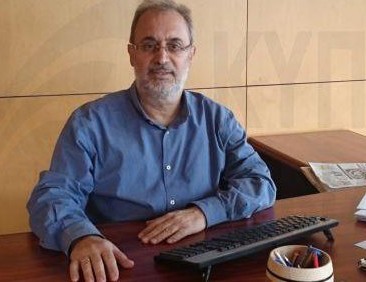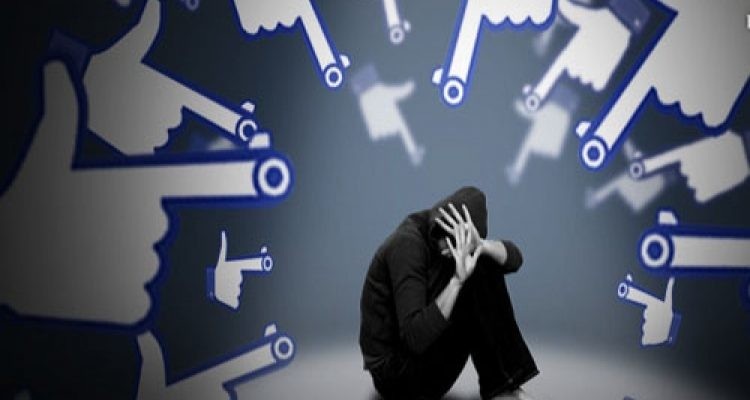"Just as fear and anxiety about the coronavirus were transmitted like an epidemic, so emotions and behaviours related to violence and revenge can spread in society – and this is the phenomenon of emotional epidemiology," neurologist-psychiatrist Dr. Kyriakos Veresies, professor at Philips University (chairman of the Department of Social Sciences and Behaviour), told "F". when we invited him to comment on the outbreak of violence, especially by young people, that we have been experiencing lately in Cyprus.

He added that "it is worrying this unprecedented situation of increased violent crime, individual and group, such as murders, attacks that result in injuries to people or destruction of property and others. And equally worrying is the role played by the Mass Media (Media) and Social Media (NGO) in strengthening and expanding the surrounding atmosphere of violence." Relevant is the recent observation of the social researcher in Athens, Stratos Fanaras, that "the overexposure of citizens/viewers to criminal stories and criminal personalities of the 'next door', addicts to violence and paradox".

However, the president of the Cyprus Journalists' Association, Giorgos Fragos, to whom we brought to the attention of Dr. Veresier's reports, "does not share the view that there is an over-promotion of violence in the Cypriot media", as he told us. He pointed out that "such over-promotion" is observed more "in the online press, which is haunted by the scourge of sensationalism", in his expression. He went on to emphasize that "the lion's share in terms of fostering violent behaviours belongs to the NGOs and not to the media."
Technology and Factor Interaction
Responding to our question, Dr. Veresies stressed that "the root of the evil in this case, in this age of communication, through modern technology, lies in the complex interaction of factors. In an effort to increase viewership or traffic, the media constantly reproduces negative news and details of murders and violent acts, in a chilling way. And something very worrying is that they are transferred to all the media, with all the details and the crimes committed in another country, Greece, in a way that gives the impression that they are happening in our own territory! In other words, the TV series that have revenge and death as their only theme are not enough, there is a metaphor for the "living death" that poisons the human soul. from somewhere else, in our house. This constant exposure to cruel violence and tragedy emotionally shakes the person, creating a climate of fear, anger and, possibly, despair. Repeating and covering these events in detail acts like a virus that transmits these negative emotions and, ultimately, influences behaviours."
To our question "How does frequent exposure affect violent narratives, even fiction?", Dr. Veresiez answered: "The reproduction of violence on television and online has multiple negative effects. At the top of the viewership of recent years are Greek series, with themes such as death, revenge and vendetta, which familiarize the audience with acts of violence. This constant exposure, even to fiction, can reduce sensitivity to the consequences of violence, degrade the value of human life and dignity, and legitimize, in a way, its use as a means of resolving disputes. "Revenge" as a driving force in these narratives can be subconsciously translated into an acceptable solution to personal differences. When a person is repeatedly exposed to such scenes, violence begins to seem like a normal, or even effective, reaction to confrontations. This "normalization" paves the way for imitation. People, especially young people who are more vulnerable to personality formation, may begin to see these violent behaviours as role models or solutions to their own problems, leading to dangerous tendencies toward self-righteousness or aggression."

Distrust of justice and... Self-righteousness
We asked Dr. Kyriakos Veressie what role the lack of trust and distrust of citizens towards justice plays in the development of these trends. The answer we received: "This is precisely where one of the most dangerous factors lies. When citizens feel that the justice system is not working effectively, then they may be led to a wrong moral lesson: that they can deliver justice, on their own. This perception reinforces the tendency for self-justice and the resolution of disputes through violence. The idea of revenge now takes on a dangerous dimension, as it is no longer a fictional scenario, but a possibly... justified personal action, for the restoration of an injustice. This is particularly worrying, as it undermines the basic principles of the rule of law and can lead to a vicious cycle of violence, where everyone assumes the role of judge and executioner..."
Have we also sought an answer to how these behaviours, especially violence and revenge, are transferred to specific groups or to the wider society in Cyprus?
"To be understood," Dr. Veresiez told us, "we need to understand that behaviour is highly contagious. Similarly, continued exposure to violence and revenge – whether through the news or through entertainment – can act as a catalyst for the spread of violent behaviour to specific groups, such as young people, or to the wider society. The transfer of behaviours to mass demonstrations also applies here: the violence projected can be legitimized and reproduced by individuals or groups who feel wronged, have lost their trust in institutions, or have simply become familiar with the image of violence as a solution. Imitation is not always conscious – it can be a subconscious adoption of patterns that we see prevailing."
Normalization, imitation, insecurity
Asked why it is so important to avoid excessive detail and harsh reproduction of violent events, Dr. Veresiez replied: "As we have mentioned, the media and NGOs often present murders and acts of violence, with excessive detail, cruelty and constant repetition. And they do this, seeking viewership and clicks and essentially acting as "advertisers" of violence. This approach has disastrous consequences:
*Normalization of violence: Constant exposure to such images and descriptions makes violence seem normal or inevitable. The sense of shock and disgust that it should cause decreases and violence is incorporated into our daily lives as something ordinary.
*Promoting imitation: When acts of violence are projected in this way, they can inspire mimetic behaviours, especially in vulnerable individuals who are looking for ways to express anger, hopelessness or a sense of injustice. Detailed coverage can unwittingly give ideas or show ways to people with psychological problems or aggressive tendencies.
*Increase in fear and anxiety: Instead of calmly informing, the media and NGOs can create a climate of panic, excessive fear and insecurity, making citizens feel that society is more dangerous than it really is."
Responsible coverage, logical thinking, empathy
Dr. Veresies told us about the positive side of emotional epidemiology: "The optimistic side of emotional epidemiology is that, while emotions and behaviours are contagious, we can choose which one to transmit. Instead of conveying negative emotions and violent behaviours, we can choose to spread behaviours that enhance prevention, rational thinking, empathy, and trust in institutions. Responsible coverage by the media and NGOs is therefore needed, avoiding excessive detail and harsh reproduction of violent events, enhancing trust in justice, promoting positive standards for resolving disputes through dialogue and cooperation, and strengthening social ties. The optimistic side of emotional epidemiology is that we can choose to use it for good, leading to prevention and a healthier social environment."
What practices would you suggest to the media to help prevent violence, without violating press freedom, we asked, and Dr. Veresiez noted: "Press freedom is fundamental, but it comes with responsibility. Instead of reproducing harsh details of crimes, the media should focus on analysing the root causes of violence, such as socio-economic factors, psychological dimensions, or deficiencies in the system. That means fewer creepy descriptions and more in-depth reporting, with experts. Also, the language and images used should not dramatize the violence, nor heroize the perpetrators, even if this is done in a negative way for the perpetrators. Excessive exposure to people involved in violent incidents can give them an unwanted celebrity. The approach must be calm, objective and not feed curiosity about extremes. The media, instead of showing the violent act, can project the painful consequences of violence on victims, their families and society as a whole. They can also highlight prevention efforts, support programmes and positive examples of conflict resolution and inform the public about the effectiveness of the justice system, procedures and punishment of the guilty. Finally, media operators could strengthen their codes of conduct in terms of covering up violence and implement self-regulatory mechanisms. Educating journalists on the psychology of violence and its effects is also essential."
Self-regulation, training and... low wages...
"I do not share the view that there is an over-promotion of violence in the Cypriot media," said the president of the Cyprus Journalists' Association, Giorgos Fragos. "On the contrary," he added, "I believe that the principles and rules of journalistic ethics are functioning to a fairly satisfactory degree. Details, tickling or repulsive, are avoided and only those elements that constitute and substantiate a fact are cited. Of course, this is not always the case and it is not the case to a greater extent in the online press, which is haunted by the scourge of sensationalism, by the chase of traffic and clicks.
Television often succumbs to the lure of sensationalism. Not infrequently, TV bulletins are overwhelmed with details that do not offer the news, but simply invest in the low instincts of the public, their curiosity, etc. It is not a matter of grading responsibilities, but the lion's share in terms of fostering violent behaviour, I believe, belongs to the NGOs and not to the media. There is no ethical rule and no control is exercised. Of course, improvement moves can also be made on our part, the journalistic world.
The Cyprus Journalists' Union has been doing this over time, with continuous training of its members, but also through its action in general and especially as a founding member of the Journalistic Ethics Committee, where very important work is also carried out. Through the self-regulation of the journalistic profession, much can still be done. It is enough for the media entrepreneurs, the employers of journalists, to want to invest in training and the cultivation of a relevant culture in the members of their editorial staff. With understaffing and low-paid staff, neither journalism is properly served, nor ethics."
